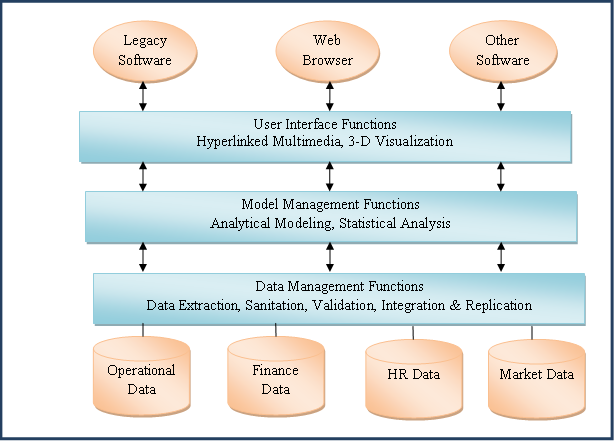Decision Support System (DSS) Proposal for The Grange
 ‘The Grange’ needs to adopt a Decision Support System (DSS). This system is used as an analytical model, for the specialization of databases within the hotel.DSS is made so that it can help the managers with decision making, this system does not make the decision but it provides insights and judgments to manager. DSS also provide support to the manager especially when they are making semi-structured and unstructured business decisions. Decision Support System (DSS) will provide the management team of ‘The Grange’ to create an interactive modeling process for the hotel and its expansion plan. For example, if The Grange uses a DSS software package for decision making regarding expansion plans, the software is going to alternatives to the manager regarding the outcome and this is going to help the management team to make the right decision. What happens is that in this system the manager enters different variables to see different outcomes. But if we look at it from the demand response it is quite difficult to comprehend since the decision makers are not very determined to demand pre-specified information while making the right decision. Therefore the management team will not have the right information that they need in advance and this might lead them to make a wrong decision. Hence with the help of DSS the management team at ‘The Grange’ will be able to find the information they need to help make the right decision regarding the expansion plan.
‘The Grange’ needs to adopt a Decision Support System (DSS). This system is used as an analytical model, for the specialization of databases within the hotel.DSS is made so that it can help the managers with decision making, this system does not make the decision but it provides insights and judgments to manager. DSS also provide support to the manager especially when they are making semi-structured and unstructured business decisions. Decision Support System (DSS) will provide the management team of ‘The Grange’ to create an interactive modeling process for the hotel and its expansion plan. For example, if The Grange uses a DSS software package for decision making regarding expansion plans, the software is going to alternatives to the manager regarding the outcome and this is going to help the management team to make the right decision. What happens is that in this system the manager enters different variables to see different outcomes. But if we look at it from the demand response it is quite difficult to comprehend since the decision makers are not very determined to demand pre-specified information while making the right decision. Therefore the management team will not have the right information that they need in advance and this might lead them to make a wrong decision. Hence with the help of DSS the management team at ‘The Grange’ will be able to find the information they need to help make the right decision regarding the expansion plan.
Information System Diagram (DSS)
Therefore DSS was created so that they are considered to be ad hoc and would respond quickly when there is a need. And lastly the DSS is controlled by the individuals who make the decision within the company. DSS supports the decisions in a direct manner to a specific decision making styles and the needs it fulfills all the requirements of individuals like the executives, managers and business professionals. (O’Brien 2004).
Performance Measures
According to Gupta (2005), the performance measurement can be defined as “Performance measurement is the process of quantifying the efficiency and effectiveness of action.”
And moreover, Bourne and Neely (2003) also mention that the performance measurement can not be done in isolation and performance measurement is only relevant within a reference framework against which the efficiency and effectiveness of action can be judged.
In our case, the performance measurement helps the company (Grange) to measure the performance of the new facilities by using different measurement tools. This also helps the company to keep focused and follow the target routine in order to achieve the targets.
The performance measurement of the expansion plan is not only vital for the internal management to see if the new project is a success story, but also it is of great importance for external stakeholders, such as shareholders, local government and others. Therefore, the measuring the performance of the new expansion is needed to keep in a right direction and satisfy the curiosity of external stakeholders.
Here are the following performance measures that can be used to measure the success of the new expansion of Grange:
- Compare actual to budget
The management of Grange may compare the actual results to that of the budgeted results. The company always sets the budget for each year that will help the company to keep focused and follow that target. If the company does well, better than the budget, this means that the company has been successfully operating.
The detailed comparisons can be revenues, costs, number of customers served, profit and other figures in the budget.
By doing this, the company knows if the relevant department managers are doing their jobs effectively and efficiently, if not, that can be included into the performance appraisal of management and staff.
And it also helps to identify if the expansion has been contributing to the overall business operations of the parent company.
- Compare actual to industry average
In this measurement of performance, the company’s operations are compared against to competitors and industry average. If the company has been achieving higher revenue, less cost and more customers, then the company is doing the right thing by performing better than those of competitors.
If not, the management needs to find out the mistakes they are making that is preventing them from performing in line with industry average.
- Benchmarking:
Benchmarking is the third performance measure which can be developed within the information system to enable the management team to measure the success of the expansion plan. With the help of benchmarking the management team of the hotel will be able to continuously measure the operations of the expansion plan. One thing needs to be remembered about benchmarking is that once a strong and a compatible program has been founded and analyzed by the hotel then the benchmarking hotel will be able to create and develop a strategy for implementing a new programming and becoming as worthy as the leading hotels within the industry. Benchmarking is considered to be a tool which will help the hotel to learn and will help in measuring the performance against the leading hotels within the industry. Benchmarking is still considered to be one of the most important steps in the evaluation of the performance. The Grange can develop a benchmarking index to analyze the performance of the operating regarding the expansion plan. (Kaplan & Norton 2006)
Reference:
- Armstrong, M, 2000, Strategic Human Resource Management: A Guide to Action. Kogan Page Publishers
- Brickley, J., Smith, C., Zimmerman, J. & Willett, J., 2002, Designing Organizations to Create Value: From Strategy to Structure. McGraw-Hill
- David, F. R., 2006, Strategic Management: Concepts and Cases. Prentice Hal
- Drucker, P F, 2007, Management: Tasks, Responsibilities, Practices. Transaction Publishers
- Kaplan, R S. & Norton, D P., 2006, The Strategy – Focused Organization. Harvard Business Press
- Miles, R & Snow, C., 2003, Organizational Strategy, Structure, and Process. Stanford Business Books
- Myburgh, S, 2002, Strategic Information Management: Understanding a New Reality. Viewed May, 30, 2010 < http://findarticles.com/p/articles/mi_qa3937/is_200201/ai_n9020322/>
- Pour-Khosrow, M, 2006, Emerging Trends and Challenges in Information Technology. Idea Group Inc (IGI)
- Ordonez, M & Serrat, O, 2009, Knowledge Solutions: Disseminating Knowledge Product, Viewed May, 30, 2010 < http://www.adb.org/documents/information/knowledge-solutions/disseminating-knowledge-products.pdf>
- Stair, R M., Reynolds, G & Reynolds, G W., 2009, Principles of Information System. CENGAGE Learning
- Williams, B.K. & Sawyer, S C, 2001, Using Information Technology: A Practical Introduction to Computers and Communications. New York: McGraw-Hill

